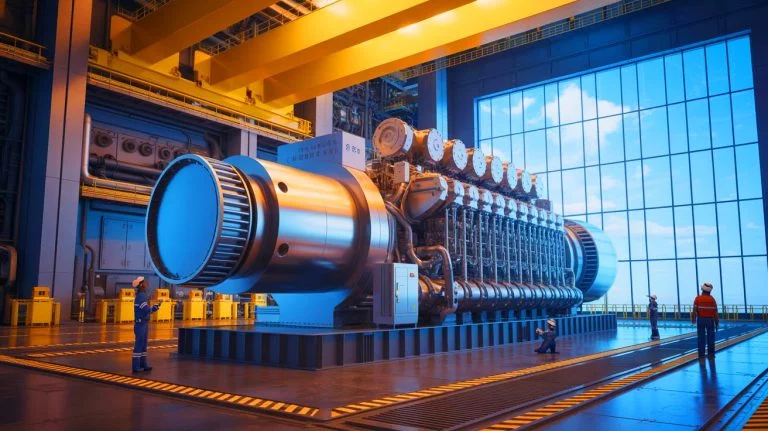| IN A NUTSHELL |
|
In a historic move toward cleaner energy, China has unveiled the world’s first 500 megawatt hydrogen-cooled generator. This development marks a significant milestone in energy innovation, showcasing China’s commitment to reducing carbon emissions and advancing green technologies. Such advancements in hydrogen energy are not only crucial for China but also have global implications, as many countries seek sustainable and renewable energy sources. The introduction of this cutting-edge technology highlights the rapid pace of energy innovation and poses questions about the future of traditional energy sources.
China’s Bold Move in Energy Innovation
China’s launch of the 500 megawatt hydrogen-cooled generator is a testament to the country’s ongoing efforts to lead in sustainable energy technology. This project represents a significant leap forward in energy efficiency and environmental stewardship. Hydrogen cooling in generators, while not entirely new, has not been implemented at this scale before. The use of hydrogen as a cooling agent improves the efficiency and safety of power generation, offering a cleaner alternative to traditional methods.
This move is part of China’s broader strategy to reduce reliance on fossil fuels and decrease carbon emissions. As the world’s largest emitter of greenhouse gases, China has faced significant pressure to change its energy practices. The introduction of hydrogen-cooled technology is a step in the right direction, potentially setting a benchmark for other countries to follow. The global energy community is watching closely, eager to see if this innovation will lead to widespread adoption.
The Science Behind Hydrogen Cooling
Hydrogen cooling involves using hydrogen gas to regulate the temperature of generators, making them more efficient and less prone to overheating. This method is advantageous due to hydrogen’s superior thermal conductivity compared to air. By maintaining a lower operational temperature, generators can operate more efficiently and with reduced energy loss. The transition to hydrogen cooling also means a reduction in operational costs and an increase in the lifespan of equipment.
The implementation of this technology requires significant investment and expertise, as hydrogen must be carefully managed to prevent leaks and ensure safety. However, the benefits of hydrogen cooling, including increased efficiency and decreased environmental impact, make it an attractive option for future power generation projects. As the technology matures, it could revolutionize the way the world generates electricity.
Global Implications and Future Prospects
The introduction of hydrogen-cooled generators in China could have far-reaching implications, influencing global energy policies and practices. As countries strive to meet international climate goals, the adoption of such technologies could accelerate the shift toward greener energy sources. This development may prompt other nations to invest in similar technologies, enhancing international cooperation in the fight against climate change.
However, the transition to hydrogen-cooled systems is not without challenges. Infrastructure changes, regulatory adjustments, and economic factors must all be considered. Despite these hurdles, the potential benefits of reduced carbon emissions and increased energy efficiency make the pursuit of hydrogen technology worthwhile. The global energy landscape is on the cusp of transformation, with hydrogen playing a key role in this evolution.
Challenges and Opportunities for the U.S.
The United States, a leader in energy production, faces both challenges and opportunities with the advent of hydrogen-cooled technology. While the U.S. has made strides in renewable energy, the adoption of hydrogen-cooled systems could further enhance its energy portfolio. However, this requires significant investment in research and development, as well as adaptations to existing infrastructure.
The U.S. can benefit from China’s experience, learning from their implementation strategies and technological advancements. There is an opportunity for collaboration between the two nations, which could lead to shared innovations and solutions in the energy sector. As the world moves toward cleaner energy, the U.S. must decide how to integrate hydrogen technology into its own systems, balancing environmental goals with economic realities.
As the world watches China’s progress with hydrogen-cooled generators, the potential for this technology to reshape the global energy landscape becomes increasingly evident. The question remains: How will other countries, including the United States, respond to this technological leap, and what role will hydrogen play in the future of energy generation?
Did you like it? 4.4/5 (29)





Wow, China is really taking the lead in clean energy! 🌱
Thank you for highlighting this innovation. It’s inspiring! 🙏
How does hydrogen cooling compare to other green technologies?
China’s doing it again! When will others follow suit?
Does this mean electricity will be cheaper in the future?
I can’t believe the US is lagging behind. Time to step up!
500MW sounds impressive, but what does that mean for everyday energy users?
Great article! Very informative. Keep them coming! 👍
Does hydrogen cooling have any negative environmental impacts?
Who else is working on hydrogen tech apart from China?
Is this tech scalable for smaller countries?
Are there any potential downsides to using hydrogen?
Just imagine how much CO2 we could cut down with this! 🌍
How soon can we expect other countries to adopt this technology?
What are the main challenges facing hydrogen cooling adoption?
Does this mean we can finally say goodbye to fossil fuels? 🤞
Are there plans to integrate this technology globally?
How does hydrogen cooling affect the efficiency of generators?
Isn’t hydrogen flammable? How do they manage that risk?
Bravo to China for leading the way in clean energy! 👏
How much did this project cost China? 💰
Is the US doing anything to collaborate with China on this?
Finally, some good news for the planet! 🌿
What are the economic implications of this tech shift?
Is this innovation going to create new jobs in the energy sector?
How reliable is hydrogen cooling compared to traditional methods?
This is amazing! Can’t wait to see what’s next in energy innovation!
What’s the lifespan of these hydrogen-cooled generators?
More articles like this, please! Very enlightening! 😊
Are there any countries already using this technology?
Is hydrogen cooling safe? It sounds a bit risky to me! 😬
Can the US catch up with China in this tech race?
Hope this isn’t just hot air… or should I say hydrogen? 😄
Why isn’t the US investing more in hydrogen technology?